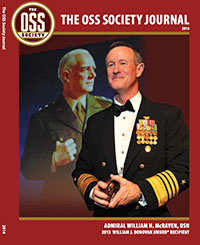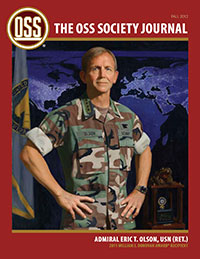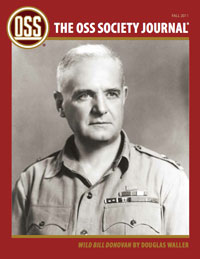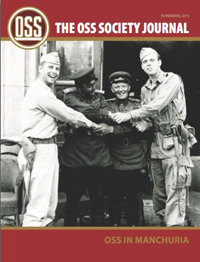Roger Hall; Memoirist of World War II Espionage
July 2008
By Adam Bernstein
Washington Post Staff Writer
Tuesday, July 22, 2008; B06
Roger Hall, 89, who wrote "You're Stepping on My Cloak and Dagger," a wry memoir about World War II spycraft that became a cult classic in intelligence circles and appealed to a wide audience for its irreverence, died July 20 at his home in Wilmington, Del. He had congestive heart failure.
Mr. Hall's 1957 bestseller, dedicated "to whom it may concern," was based on his time in the Office of Strategic Services, the wartime precursor to the CIA. The appeal was in Mr. Hall's narrative as a man of nerve battling the enemy and his pompous superiors.
Hayden Peake, a former Army intelligence and CIA agent and an authority on the literature of intelligence, called the book "one of the best OSS memoirs," saying it was written by "someone who could perform [dangerous work] but was a kind of a free spirit."
Critic Charles Poore, writing in the New York Times in 1957, called the memoir "the funniest (unofficial, that is) record of rugged adventure in the O.S.S."
The son of a Navy captain, Mr. Hall grew up in Annapolis. He said the OSS book was not meant to show "contempt for authority, but bridling at authority."
Mr. Hall described himself as an ideal match for the OSS, which was interested less in formal military expertise than in recruiting agents who could use their wits and innovation in sticky situations to win the war.
Roger Hall, 89, who wrote "You're Stepping on My Cloak and Dagger," a wry memoir about World War II spycraft that became a cult classic in intelligence circles and appealed to a wide audience for its irreverence, died July 20 at his home in Wilmington, Del. He had congestive heart failure.
Mr. Hall's 1957 bestseller, dedicated "to whom it may concern," was based on his time in the Office of Strategic Services, the wartime precursor to the CIA. The appeal was in Mr. Hall's narrative as a man of nerve battling the enemy and his pompous superiors.
Hayden Peake, a former Army intelligence and CIA agent and an authority on the literature of intelligence, called the book "one of the best OSS memoirs," saying it was written by "someone who could perform [dangerous work] but was a kind of a free spirit."
Critic Charles Poore, writing in the New York Times in 1957, called the memoir "the funniest (unofficial, that is) record of rugged adventure in the O.S.S."
The son of a Navy captain, Mr. Hall grew up in Annapolis. He said the OSS book was not meant to show "contempt for authority, but bridling at authority."
Mr. Hall described himself as an ideal match for the OSS, which was interested less in formal military expertise than in recruiting agents who could use their wits and innovation in sticky situations to win the war.
"There were no parameters, and you did what the hell you wanted, up to legal and military limits," he told The Washington Post in 2002. "The more creative you were, the more they liked it."
One of his favorite OSS stories involved a colleague sent to occupied France to destroy a seemingly impenetrable German tank at a key crossroads. The French resistance found that grenades were no use.
The OSS man, fluent in German and dressed like a French peasant, walked up to the tank and yelled, "Mail!"
The lid opened, and in went two grenades.
Mr. Hall learned guerrilla warfare at Congressional Country Club, which the OSS had taken over for training, and infiltrated a Philadelphia circuit breaker plant on a test run. He not only got a job at the plant, but the handsome trainee also wangled a date with a woman in the personnel office who happened to be the company vice president's daughter.
His made-up identity included a falsehood about being wounded while parachuting into Sicily, and the vice president was so taken with his bravery that he invited Mr. Hall to speak at a company war bond rally. He did the job so well that news of his rousing speech was published in a local paper.
"You're supposed to be a spy, not a bond salesman," an OSS companion said.
Mr. Hall spent much of the war in Great Britain, training and working alongside a motley gang of paratroopers: new recruits, war-hardened Poles and the occasional rising star, such as future CIA director William E. Colby. (He later was an usher at Colby's first wedding.)
Ultimately, Mr. Hall arrived in a war zone, the little-known but strategic Norwegian theater of operations. "Operation Better-Late-Than-Never," he called it.
One of his tasks was to oversee the surrender of thousands of Germans to his small contingent. Mr. Hall said the German colonel who surrendered to him pulled out a ceremonial dagger and told Mr. Hall that his men were like blades -- temporarily sheathed.
Mr. Hall grabbed the dagger and broke it on the ground with his feet, one of his proudest dramatic moments.
Roger Wolcott Hall was born May 20, 1919, in Baltimore. He graduated from Annapolis High School in 1936 and a year later from the private Severn School before entering the University of Virginia.
"My father did not feel I was mature enough to go to college," he told The Post, explaining the year at Severn. "My mom died, I was utterly miserable and probably immature."
At U-Va., he became captain of the lacrosse team and a member of the Punch and Julep dramatic society before graduating in 1941. He wrote for the yearbook and singled out his own fine performance in an all-male revue perceptively titled "That's No Lady."
Mr. Hall initially joined the Army and finished the war at the rank of captain. After his discharge, he became a press box announcer for the Baltimore Colts. The job ended because the Colts' management did not appreciate his reaction to a referee's call against the team on what could have been its winning field goal.
"A Seeing Eye dog has been lost," Mr. Hall said over the public-address system. "Will the owner please return it to the officials' dressing room?"
Mr. Hall spent most of his life in New York as a freelance writer and editor. In the early 1970s, he had a stint, his favorite job, as cartoon editor for the old True magazine in New York.
He also was the host of radio shows, including one called "You Can't Fight Roger Hall," and wrote two novels, "All My Pretty Ones" (1959), a humorous book based on his relationship with a fashion model, and "19" (1970), a spy story.
He moved to Delaware in the 1980s with his wife, Linda Texter Hall, a poet and yoga instructor whom he married in 1973. She is his only immediate survivor.
Mr. Hall always threatened to write new books, including a collection of poetry he wanted to call "Bayonet the Survivors and Other Love Poems."
He wanted his epitaph to read, "He deserves paradise who makes his companions laugh," a phrase sometimes attributed to the Koran.
Adam Bernstein wrote the introduction to "You're Stepping on My Cloak and Dagger" when it was reissued in 2004 by the Naval Institute Press.
One of his favorite OSS stories involved a colleague sent to occupied France to destroy a seemingly impenetrable German tank at a key crossroads. The French resistance found that grenades were no use.
The OSS man, fluent in German and dressed like a French peasant, walked up to the tank and yelled, "Mail!"
The lid opened, and in went two grenades.
Mr. Hall learned guerrilla warfare at Congressional Country Club, which the OSS had taken over for training, and infiltrated a Philadelphia circuit breaker plant on a test run. He not only got a job at the plant, but the handsome trainee also wangled a date with a woman in the personnel office who happened to be the company vice president's daughter.
His made-up identity included a falsehood about being wounded while parachuting into Sicily, and the vice president was so taken with his bravery that he invited Mr. Hall to speak at a company war bond rally. He did the job so well that news of his rousing speech was published in a local paper.
"You're supposed to be a spy, not a bond salesman," an OSS companion said.
Mr. Hall spent much of the war in Great Britain, training and working alongside a motley gang of paratroopers: new recruits, war-hardened Poles and the occasional rising star, such as future CIA director William E. Colby. (He later was an usher at Colby's first wedding.)
Ultimately, Mr. Hall arrived in a war zone, the little-known but strategic Norwegian theater of operations. "Operation Better-Late-Than-Never," he called it.
One of his tasks was to oversee the surrender of thousands of Germans to his small contingent. Mr. Hall said the German colonel who surrendered to him pulled out a ceremonial dagger and told Mr. Hall that his men were like blades -- temporarily sheathed.
Mr. Hall grabbed the dagger and broke it on the ground with his feet, one of his proudest dramatic moments.
Roger Wolcott Hall was born May 20, 1919, in Baltimore. He graduated from Annapolis High School in 1936 and a year later from the private Severn School before entering the University of Virginia.
"My father did not feel I was mature enough to go to college," he told The Post, explaining the year at Severn. "My mom died, I was utterly miserable and probably immature."
At U-Va., he became captain of the lacrosse team and a member of the Punch and Julep dramatic society before graduating in 1941. He wrote for the yearbook and singled out his own fine performance in an all-male revue perceptively titled "That's No Lady."
Mr. Hall initially joined the Army and finished the war at the rank of captain. After his discharge, he became a press box announcer for the Baltimore Colts. The job ended because the Colts' management did not appreciate his reaction to a referee's call against the team on what could have been its winning field goal.
"A Seeing Eye dog has been lost," Mr. Hall said over the public-address system. "Will the owner please return it to the officials' dressing room?"
Mr. Hall spent most of his life in New York as a freelance writer and editor. In the early 1970s, he had a stint, his favorite job, as cartoon editor for the old True magazine in New York.
He also was the host of radio shows, including one called "You Can't Fight Roger Hall," and wrote two novels, "All My Pretty Ones" (1959), a humorous book based on his relationship with a fashion model, and "19" (1970), a spy story.
He moved to Delaware in the 1980s with his wife, Linda Texter Hall, a poet and yoga instructor whom he married in 1973. She is his only immediate survivor.
Mr. Hall always threatened to write new books, including a collection of poetry he wanted to call "Bayonet the Survivors and Other Love Poems."
He wanted his epitaph to read, "He deserves paradise who makes his companions laugh," a phrase sometimes attributed to the Koran.
Adam Bernstein wrote the introduction to "You're Stepping on My Cloak and Dagger" when it was reissued in 2004 by the Naval Institute Press.







